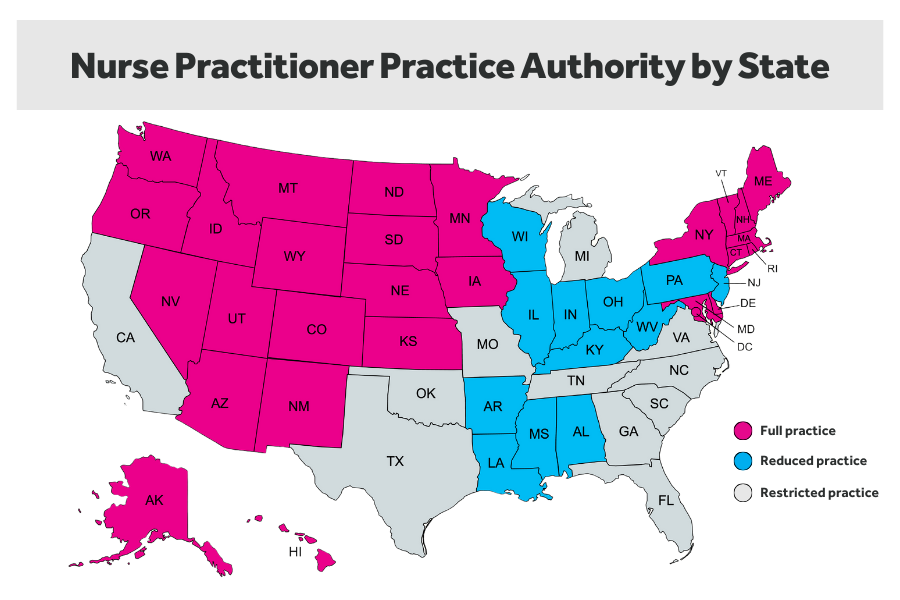Nurse Practitioner (NP) Scope of Practice: Overview and FAQ

Nurse practitioners (NPs) are advanced practice nurses who help lead the direction of patient care, either independently or in collaboration with other healthcare providers. NPs undergo specialized training and education so that they can have more autonomy and take on an expanded set of responsibilities. However, just like nursing assistants and nurses, they must stay within the NP scope of practice to avoid legal repercussions.
But, what exactly does the scope of practice for an NP look like and how does it differ by state? In this overview, we’ll answer some of the most frequently asked questions about how NPs can practice in the U.S. so that you can enforce appropriate care protocols at your facility.
Nurse Practitioner Scope of Practice: FAQs
The NP scope of practice is constantly adapting to meet the shifting demands of patient care. Practice regulations also differ quite widely from state-to-state, so it’s important to stay informed of updates from your board of nursing. To help you understand these differences and the overarching responsibilities of an NP, we’ll answer some general FAQs below.
What is the NP scope of practice?
Broadly speaking, scope of practice refers to the regulatory framework defining what nursing professionals can and cannot do based on their education and training. Since NPs have achieved the highest level of training, they have a much broader scope of practice than RNs.
The exact scope of practice for NPs varies by location and is detailed in each state’s Nurse Practice Act (NPA). However, according to the American Association of Nurse Practitioners (AANP) standards of practice, NPs generally take on a range of care duties, such as:
- Diagnosing acute, chronic, and complex health conditions.
- Interpreting and supervising diagnostic/laboratory tests.
- Initiating care plans and managing treatment.
- Educating individuals, groups, and communities.
- Coordinating care and patient referrals.
How does the NP scope of practice differ by state?
State-by-state practice guidelines primarily differ by the level of authority that an NP is granted. More specifically, there are three main categories that their scope of practice can fall under:
- Full Practice Authority: For nurse practitioners, working in full practice authority states means that they can carry out their duties without supervision. These NPs can independently prescribe medications and even open up their own practices.
- Reduced Practice Authority: Reduced practice states limit what NPs can carry out independently. Typically, NPs in these states can’t run their own practices or prescribe medications without a supervising physician. However, they can practice relatively independently within a physician-owned practice under a collaborative agreement.
- Restricted Practice Authority: Restricted practice states don’t treat NPs as independent practitioners. NPs in these states must carry out all of their duties under the supervision of a physician.
In which states do NPs have full practice authority?
There are currently 28 states/territories that grant NPs full practice authority. In other states, NPs must work either in collaboration with or under the supervision of a physician. The full list of states and territories (plus the District of Columbia) that grant full, reduced, and restricted practice authority are outlined in the map below.
For more details on each state’s scope of practice regulations for NPs, you can visit the AANP’s state-by-state guide.
Does the NP scope of practice differ by specialty?
While an NP’s job responsibilities can vary by specialty, scope of practice regulations are typically not setting-specific. NPs working in certain settings may just need to keep track of more tasks that fall inside and outside of their scope of practice.
For example, NPs can sometimes carry out more invasive procedures (e.g., chest-tube insertion) in acute care. NP scope of practice guidelines around these procedures vary by state — but NPs working in hospitals will likely need to keep closer track of these differences than do NPs working in facilities that don’t offer these procedures, such as nursing homes.
What can an MD do that an NP can’t?
A Doctor of Medicine (MD) and an NP have many overlapping duties, but there are some key differences in their scope of practice. Unlike NPs, MDs have no state-specific restrictions on prescribing medications and treatment plans. Additionally, MDs can lead surgical procedures, whereas NPs typically only assist in surgeries or perform minimally invasive procedures.
What can a PA Do That an NP Can’t?
Physician Assistants (PAs) are a type of advanced, licensed healthcare professional that are trained under the medical model. Both PAs and NPs can diagnose conditions and help direct treatment plans. But, unlike NPs, PAs always work interdependently with physicians.
What happens if NPs step outside of their scope of practice?
NPs who step outside of their scope of practice may face disciplinary action from their state’s board of nursing. Penalties can range in severity from remedial education to license suspension. In some cases, these NPs could even face a malpractice lawsuit.
It’s important for facility leaders and NPs to stay informed about the NPA to ensure that they’re practicing in accordance with all state laws. You can also get helpful compliance resources from the AANP scope of practice information center.
Stay Up-To-Date With the NP Scope of Practice and More
Keeping up with all of the regulations that impact your staff is a daunting, but important task. Need a more practical way to get the information you need? IntelyCare offers free, expert-written healthcare insights to help facility leaders maintain compliance and meet the highest standards of care.
Legal Disclaimer: This article contains general legal information, but it is not intended to constitute professional legal advice for any particular situation and should not be relied on as professional legal advice. Any references to the law may not be current, as laws regularly change through updates in legislation, regulation, and case law at the federal and state level. Nothing in this article should be interpreted as creating an attorney-client relationship. If you have legal questions, you should seek the advice of an attorney licensed to practice in your jurisdiction.

